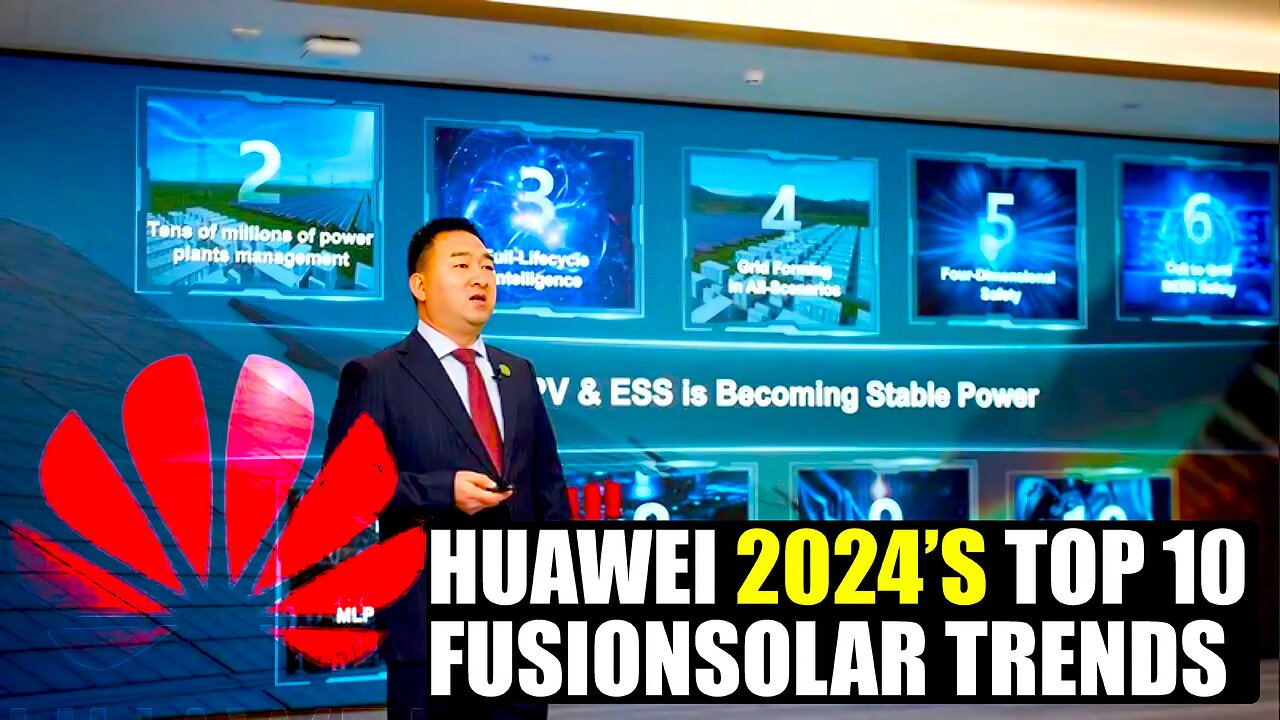Premium Only Content

Huawei Reveals Game-Changing FusionSolar Trends for 2024, Revolutionizing PV Energy!
Huawei Reveals Game-Changing FusionSolar Trends for 2024, Revolutionizing PV Energy!
During the global release event organized by Huawei, the focus was on the top 10 FusionSolar trends for 2024, with an emphasis on continuous innovation, high-quality development, and the acceleration of photovoltaic (PV) energy becoming the main energy source. Hao Yingtao, the Vice President and CMO of Smart PV & ESS Business at Huawei Digital Power, presented a comprehensive analysis of future trends in the industry.
One of the core trends highlighted by Yingtao was the growing global momentum towards carbon neutrality. The PV and energy storage industry is experiencing significant growth alongside this movement. According to the International Renewable Energy Agency (IRENA), it is projected that the installed capacity of PV will reach 5,200 GW by 2030 and 14,000 GW by 2050, making renewable energy account for over 90% of total power capacity, with PV playing a dominant role.
As renewable energy, particularly PV energy, continues to penetrate the market, the industry must address various challenges related to grid-connection, operation, and safety. In light of these challenges, Yingtao highlighted five key features that will be crucial for ensuring high-quality development in the PV industry:
1. Digitalization and intelligentization: The integration of digital technologies and intelligence will enhance efficiency, reduce operation and maintenance costs, and optimize the overall performance of PV systems.
2. Grid parity and subsidy-free era: The decreasing costs of PV modules and the increasing efficiency of PV plants will lead to grid parity, enabling the industry to move towards a subsidy-free era.
3. Efficient site construction and smart O&M: Advanced construction techniques, such as prefabrication and modularization, will streamline the process of building PV plants, while smart operation and maintenance practices will minimize downtime and improve system performance.
4. Energy storage integration: The combination of PV systems with energy storage technologies will optimize energy utilization, enable load shifting, and improve grid stability.
5. Green and sustainable development: The PV industry will continue to focus on environmental sustainability by reducing carbon emissions and promoting recycling and circular economy practices.
In addition to these key features, Hao Yingtao also highlighted four fundamental technologies that will play a crucial role in the high-quality development of the PV industry:
1. Advanced PV modules and technologies: The advancement of PV modules, including higher conversion efficiency, improved reliability, and better resistance to various environmental conditions, will drive the industry forward.
2. Smart PV plant solutions: Technologies such as big data analytics, artificial intelligence, and cloud computing will enable PV plants to operate more intelligently, detecting and resolving issues in real-time and optimizing energy generation.
3. Digitalization and intelligentization of inverters: Inverters, as core equipment in PV systems, will undergo digital transformation to enhance their performance, efficiency, and reliability. Intelligent inverters will also enable more flexible power control and effective grid integration.
4. Cybersecurity and safety: With the increasing digitalization and connectivity of PV systems, robust cybersecurity measures will be essential to protect against potential threats and ensure the safety and reliability of the entire system.
Hao Yingtao's presentation concluded with the release of a white paper that encompassed all the insights and trends discussed during the event. The white paper is expected to serve as a valuable resource for industry stakeholders, providing them with guidance and knowledge to navigate the evolving landscape of the PV industry.
Huawei, as a prominent player in the PV and energy storage sector, expressed its commitment to continuous innovation and high-quality development. By sharing these trends and insights, Huawei aims to contribute to the growth and advancement of the PV industry, ultimately accelerating the transition to a cleaner and more sustainable energy future.
-
 52:20
52:20
The Quartering
4 hours agoKamala Harris Has Drunken Unhinged Rant & Joe Biden Just Robbed America
94.2K45 -
![Days Gone: Old Country Road - Part 3 [PC] | Rumble Gaming](https://1a-1791.com/video/s8/1/Q/q/G/_/QqG_u.0kob-small-Days-Gone-Old-Country-Road-.jpg) LIVE
LIVE
NeoX5
5 hours agoDays Gone: Old Country Road - Part 3 [PC] | Rumble Gaming
305 watching -
 LIVE
LIVE
CAMELOT331
4 hours agoRide N' Die 24 Hour LAUNCH Ft Ethan Van Sciver, Cecil, ItsaGundam, That Star Wars Girl, Shane & MORE
281 watching -
 12:53
12:53
DeVory Darkins
18 hours ago $11.37 earnedKamala Intoxicated Video Message to Staff Shocks Internet
21.6K62 -
 1:38:22
1:38:22
Mally_Mouse
5 hours agoLet's Yap About It - LIVE!
30.5K2 -
 21:59
21:59
Midnight's Edge
1 day agoElon Musk calls out Norway for destroying its own future!
16.3K5 -
 3:23:26
3:23:26
Pardon My Take
10 hours agoSUPER MEGA THANKSGIVING PREVIEW, KIRK COUSINS WANTS TO BE IN WICKED 2 + PFT/HANK RIVARLY CONTINUES
31.3K2 -
 44:59
44:59
The Kevin Trudeau Show
5 hours agoWhat Women Do Wrong in Relationships (From a Man’s Perspective) | The Kevin Trudeau Show | Ep. 69
37.4K11 -
 19:49
19:49
This Bahamian Gyal
16 hours agoFIRED after VENTING online about ELECTION results
23.6K13 -
 5:46:42
5:46:42
REVRNDX
6 hours agoYOUR NEW FAVORITE RUMBLE STREAMER
20.4K1